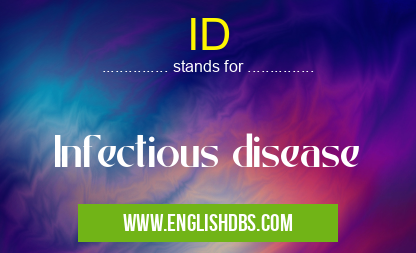What does ID mean in DISEASES
ID stands for Infectious Disease. This abbreviation is used to reference diseases which are caused by infections from pathogens such as viruses, bacteria, fungi or parasites. These infections can be spread through direct contact with an infected person, animal or object, as well as through physical contact or indirect contact with contaminated air, food or water. ID can affect people of all ages and can have serious implications if not treated properly

ID meaning in Diseases in Medical
ID mostly used in an acronym Diseases in Category Medical that means Infectious disease
Shorthand: ID,
Full Form: Infectious disease
For more information of "Infectious disease", see the section below.
Essential Questions and Answers on Infectious disease in "MEDICAL»DISEASES"
What are the common symptoms of infectious disease?
Common signs and symptoms of infectious disease include fever, chills, sore throat, difficulty breathing, nausea and vomiting. Other common signs of infection include aches and pains in the chest or abdomen and a general feeling of malaise
How is infectious disease spread?
Infectious diseases can be spread through direct contact with an infected person or object as well as through airborne particles and transmission from food or water sources. They can also be passed from one person to another through coughing, sneezing and close personal contact
Are there treatments available for infectious diseases?
Yes, there are treatments available depending on the type of infection. Generally speaking they involve antibiotics prescribed by a doctor to help fight off the infection. Other treatments may include antivirals or antifungals depending on the specific infection
Who should get tested for infectious diseases?
Everyone has a risk of getting an infectious disease so it is important for everyone to get regular tests to check their health status. People who are at higher risk due to factors such as exposure to contaminated environments may need additional testing
What preventive measures should be taken against infectious diseases?
Taking precautionary steps like handwashing regularly, avoiding close contact with anyone who might have an infection and getting vaccinated when possible are all recommended ways to reduce your risk of contracting an infectious disease
